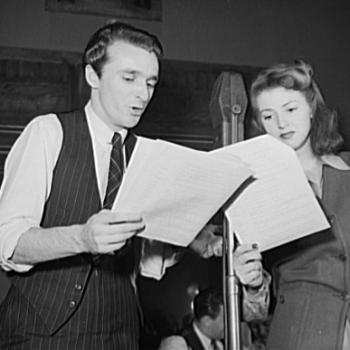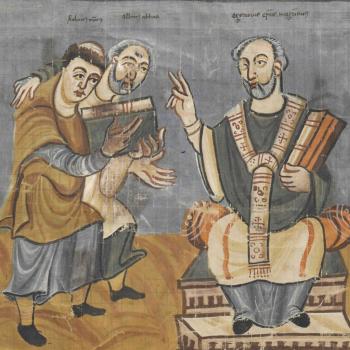No, the title isn’t a typo. From my earliest years, I have always had a special affection for Western films, and a few of these at least make powerful religious statements.
Westerns after all are set in a particular period of US history, roughly 1870-1900 or so, a time when religion broadly defined played a huge part in American life. The best films amply reflect the social history of the period. Some directors, above all John Ford, make wonderful and highly appropriate use of the hymns of the era. (See for instance Kathryn Kalinak’s How the West Was Sung: Music in the Westerns of John Ford). Actually, there’s still room for a more general book on Hymns and Westerns. There may be people who can hear “Shall We Gather at the River?” without thinking of Sam Peckinpah’s The Wild Bunch, but I am not one of them.
One of my all-time favorite films is Peckinpah’s 1962 Ride the High Country, a magnificent story of two very old gunfighters adrift in a modern world that no longer needs or understands them. Gil Westrum (Randolph Scott) and Steve Judd (Joel McCrea) are hired to carry a gold shipment from a mining camp down to the town that represents commerce and civilization. Westrum, though, plans to steal the gold, and tries subtly to win Judd over to his point of view. Judd will have none of this. Having lived a long and hard life, he says, he has little in the way of material possessions. Now, “all I want is to enter my house justified.” Realizing his cause is hopeless, Westrum must seek other means of winning his goal.
“All I want is to enter my house justified.” What exactly is this? Partly, it’s adapted from the New Testament tale of the Pharisee and the publican in Luke 18. The publican does not dare to pray at length. He “would not lift up so much as his eyes unto heaven, but smote upon his breast, saying, God be merciful to me a sinner. I tell you [says Jesus], this man went down to his house justified rather than the other: for every one that exalteth himself shall be abased; and he that humbleth himself shall be exalted” (vv.13-14).
But I show my ignorance here. Judd’s citation does not precisely match the Biblical text – he wants to enter his house, rather than go down to it. And in the context of nineteenth century America, the word “justified” carries a huge amount of Protestant theological freight. Does Judd’s version follow a particular nineteenth or twentieth century source? Is he quoting the language of revivalists at the time?
To provide a context, Peckinpah’s biographers agree that the Steve Judd character borrows heavily from Sam’s own father, David Peckinpah. We also know that Sam often gave his characters lines that he had heard growing up on a Californian ranch. Sam himself was born in 1925, so the older people around him would have been the children of the pioneer generation. I am wondering, then, whether “enter my house justified” might have been a common phrase from the turn of the twentieth century or before. Perhaps particularly in the West?
Can anyone assist me?
















